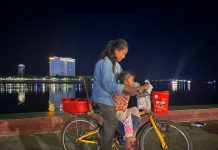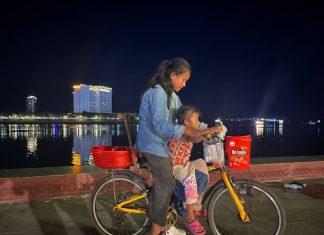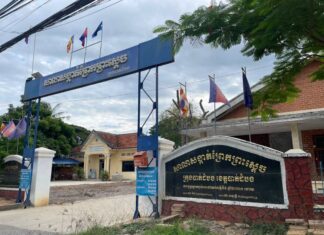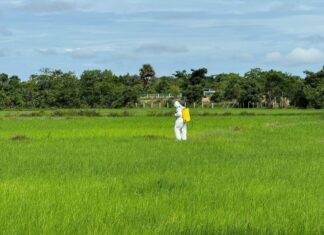Since the closure of schools due to coronavirus, about 30 percent of more than 3 million students nationwide have missed out on their education because they don’t have the technology to access online learning, Education Minister Hang Chuon Naron said on Monday.
Speaking at a groundbreaking ceremony for a digital education center at Preah Sisowath High School in Phnom Penh, Chuon Naron said about 30 percent of students were currently studying online, 30 percent were studying from TV, and about 10 percent were studying with friends or by themselves.
“The number of students with a smartphone that can access the internet is about 30 percent, and the other 70 percent of students have no smartphone,” he said. Some of the students without smartphones, however, could still study with classmates who did, he said. “Outstanding students can teach students who are not good.”
Chuon Naron said Cambodia was lagging developed countries by about a decade when it came to the availability of digital technologies, creating a challenge in implementing distance learning. The ministry will collect more information from students to try to improve the situation, he said.
He added that the schedule for annual high school exams had not yet been set, but should be about four to five months after schools reopen.
“Private schools with sufficient standards [may be] able to complete the high school examinations this August, [but] other private and public school have not determined the date for the exams,” he said.
Srey Nimet, who teaches 12th-grade geography at Hun Sen Bun Rany Wat Phnom High School in Phnom Penh, said she relied mostly on messaging on the Telegram app — rather than video conferencing software such as Zoom — when giving remote lessons.
“I’ve never taught on Zoom and mostly I teach on Telegram, by sending voice messages and telling the students what page [to look at], because all the questions come out of the textbook,” Nimet said.
But attendance was a major problem when teaching online, with only about half the students active in class, she said.
“In the classroom there are about 40 to 50 students, but with online classes there are only 20 to 30 students,” she said. “Some of those students have returned to their hometowns, some students have difficulty accessing the internet, and some students have been lazy to attend online.”
Teachers and principals have been trying to contact the students who are not in school, but many have been difficult to reach, she added.
Chan Borommy, an 11th-grade student at Preah Sisowath High School, said she attended video conferences every morning for four hours, and turned in her assignments through a messaging app. But it was difficult to engage with teachers, she said.
“I want to go [back] to school because it was easy to understand,” Borommy said. “Online learning has been difficult because of slow internet connections and the difficulty of asking questions to teachers.”
Chin Boramey, a sophomore accounting student at the Vanda Institute, said she also found it difficult to ask questions to her teacher, and watching video lessons took a long time. She said she was eager for her classes to return to campus.
“Continuing online learning is unacceptable because it is difficult to understand,” she said.
Ouk Chhayvy, president of the Independent Cambodian Teachers’ Association, said distance learning was less effective for students, and teachers were also having a hard time.
“Some rural teachers find it difficult to use modern technology, especially older teachers. Some are struggling with slow internet and others lack the money to buy equipment and [connect to] the internet,” Chhayvy said.
She said there had not been enough training for teachers, and called for the government to reopen schools with physical-distancing and clean-hygiene practices.
“Even without Covid-19, especially in the countryside, if [students] have problems in the family or an issue with family income, they frequently drop out of school,” she said. “During this Covid-19 period, livelihoods have deteriorated, pushing many rural students out of school to help their parents earn a living.”
In March, the Health Ministry ordered the temporary closure of all educational institutions to prevent the spread of coronavirus in Cambodia. More than 15,000 public and private schools have closed, affecting more than 3 million students. The Education Ministry also launched a distance learning and e-learning program by creating video tutorials and posting lessons on social media.












